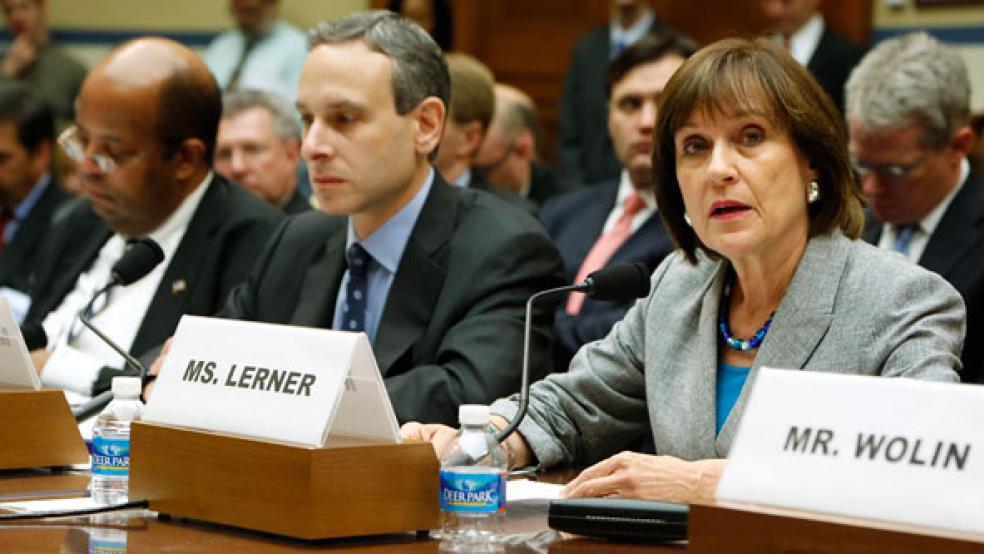The Department of Justice made news in two stories yesterday, both involving official corruption -- abuse of power and improper influence are central to both investigations. However, the DOJ offered two very different actions, leaving open the question of whether convenience and politics drove decisions on whether to indict, and whether the DOJ has the integrity to ensure the public trust.
The first announcement from Justice concerned former IRS executive Lois Lerner, who has been at the heart of a scandal involving the deliberate targeting of political opponents of the Obama administration. This scandal erupted almost two years ago, when Lerner herself apologized for targeting Tea Party groups attempting to qualify for tax-exempt status, as a means to spinning the story before a damning Inspector General report was released.
Related: Lost IRS Emails Point to an Abuse of Power and Cover-Up
When Congress demanded answers from IRS personnel, including Lerner as the executive who ran the unit handling tax-exempt requests, Lerner declared her innocence in a prepared statement – and then pleaded the Fifth.
Congress responded by subpoenaing Lerner, arguing that they had the right to cross-examine her based on the statement she read into the record. Legal experts split on whether Lerner had inadvertently waived her right to deprive Congress of its oversight after that statement.
Some, including famed appellate attorney Alan Dershowitz, argued that she had. When Lerner refused again to testify, Congress responded with a criminal complaint of contempt of Congress, and passed it along to the Department of Justice to enforce.
Nearly eleven months later, the Department of Justice has decided to pass on enforcing the contempt charge. Even though Lerner offered testimony in her opening statement and her declaration of innocence, and even though Congress has a compelling interest in oversight over corruption in the executive branch, Ronald Machen informed John Boehner that the Justice Department decided that Lerner didn’t waive her Fifth Amendment rights even while opening with a statement declaring her innocence 17 separate times.
Related: 32,774 ‘Found’ IRS Emails Prompt Criminal Probe
Those were only “general” assertions of innocence, Machen decided. “Given that assessment, we have further concluded that it is not appropriate for a United States attorney to present the matter to the grand jury for action where, as here, the Constitution prevents the witness from being prosecuted for contempt.”
Left unstated: when (or if) the Department of Justice plans to take action about the targeting itself, and Lerner for her role in it. The DOJ and the FBI claimed to have a probe in progress, but months went by while the victims waited to hear from investigators.
The targeting took place over the two years between the rise of the Tea Party in early 2010 and the election cycle in 2012, and at least appeared intended to squelch President Obama’s political opponents and their attempts to organize effectively – a corrosive abuse of power, if substantiated. Yet the DOJ has demonstrated very little sense of urgency for its investigation.
Later on Wednesday, though, the wheels of Justice turned a lot more vigorously in another case of alleged corruption. A federal grand jury indicted Senator Robert Menendez (D-NJ) on charges of bribery, conspiracy, making false statements, and using his office to improperly benefit a key donor.
Related: Lerner Computer Damage May Have Been Intentional
This case has also taken two years to come to this stage with the FBI raiding the offices of Dr. Salomon Mengel in January 2013 after corruption allegations first arose. Menendez intervened on Melgen’s behalf on a Medicare billing dispute of nearly $9 million. He also accepted private jet travel from Melgen, creating at least the appearance of quid pro quo. What
Still, the timing looks intriguing, even while the basis for a probe looks solid. A federal grand jury began reviewing evidence in February 2013, but the effort’s conclusion comes weeks after Menendez publicly split with Obama on both his Cuba policy and especially on the question of negotiating with Iran. Menendez, chair of the Senate Foreign Relations Committee until Republicans won control of the upper chamber, vehemently opposed the easing of sanctions by the White House as a teaser to get Iran to make concessions of their own. Menendez predicted – accurately, as it turns out – that Iran would use the windfall of cash to strengthen its regional efforts while giving nothing of value back to the P5+1 group on nuclear weapons.
That has some Obama opponents crying foul, but Menendez’ relationship has looked suspect for more than two years. The Department of Justice has jurisdiction to investigate when corruption may be taking place, and the circumstances surrounding Menendez and Melgen certainly prompt questions about the Senator’s intervention. Besides, forcing Menendez out would only slow down Congressional opposition to the pursuit of a deal with Iran, and likely would leave Chris Christie with an opportunity to add to the GOP’s majority, at least temporarily. Torpedoing Menendez doesn’t make much sense.
Yet these two cases provide a remarkable contrast in Justice’s reaction to two types of corruption. Personal corruption seems to get plenty of effort -- almost immediately calling a grand jury, and what looks like energetic prosecution – as it should. Corrupting the tax process and potentially two different electoral cycles, coupled with false testimony to Congress, exposure of private taxpayer data, and a government official found in contempt of Congress merit a much different level of enthusiasm and due diligence.
Taxpayers, especially as they submit their records to the IRS over the next couple of weeks, can be forgiven for wondering why.
Top Reads from The Fiscal Times:






